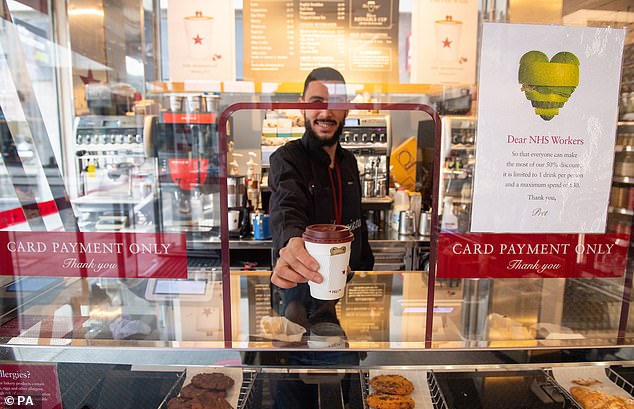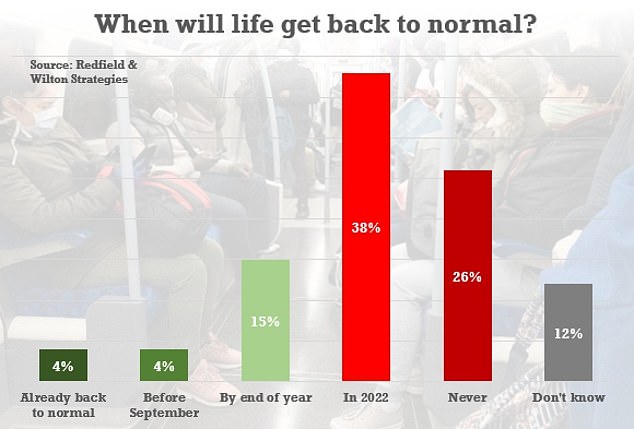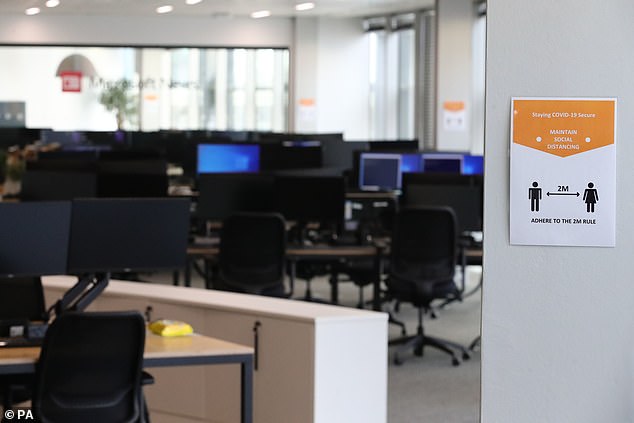Plastic screens used in pubs and workplaces are unlikely to help in stopping Covid transmission, Government scientists have said.
New guidance after ‘Freedom Day’ told employers to consider placing screens and barriers between workers to curb transmission.
But in a paper published by SAGE today, researchers warned screens could actually increase transmission rather than prevent it.
Covid spreads in tiny liquid particles which are released whenever infected people cough, sneeze, speak or breathe.
The paper said screens could help stop the virus being spread by two people sitting face-to-face no more than two metres (6ft 6in) apart.
But they offered little protection to people sat further away because the virus ‘easily pass around a screen with the airflow in a short period of time’.
The authors wrote: ‘There is some epidemiological and mechanistic evidence that suggests screens could increase risks of aerosol transmission due to blocking or changing airflow patterns or creating zones of poor air circulation behind screens.
‘Screens are unlikely to provide any direct benefit in reducing exposure to the virus from droplets or aerosols when people are already located at two metres or greater or where they are not face to face.’
The findings come amid confusion over how employers should set up the workplace for the return of staff over the coming weeks.
Documents released online just days before the July 19 unlocking suggested offices keep social distancing measures like plastic screens and back-to-back desks in a bid to placate nervous workers.

Plastic screens used in pubs and workplaces are unlikely to help in stopping Covid transmission, Government scientists have said

Exclusive research for MailOnline found 26 per cent cannot see our pre-pandemic lifestyles returning at any point

Documents released online just days before the July 19 unlocking also suggest workplaces keep social distancing measures like plastic screens and back-to-back desks in a bid to placate nervous workers
More than a quarter of Britons fear life will NEVER get back to normal after Covid
More than a quarter of Britons believe life will never get back to normal after coronavirus, according to a shock poll.
Exclusive research for MailOnline found 26 per cent cannot see our pre-pandemic lifestyles returning at any point.
The bulk of those questioned by Redfield & Wilton Strategies — 38 per cent — harboured hopes that the country will be back on track at some point next year.
But the scale of the pessimism underlines the grip ‘coronaphobia’ has taken on the national psyche – even though almost all legal lockdown restrictions are being dropped.
The survey emerged as separate Office for National Statistics (ONS) polling found people are still obeying Covid rules even though they are no longer compulsory in many cases.
Between July 21 and 25 – after ‘Freedom Day’ in England – the proportion of adults wearing face coverings outside their homes remained stubbornly at 95 per cent.
Some 61 per cent said they always maintained social distancing, down only marginally from 63 per cent the week before.
The research for MailOnline also revealed that many Britons appear to have given up on going abroad on holiday this year, amid a shambles over travel rules.
Just 10 per cent intend to travel abroad while four per cent intend to travel both abroad and domestically this summer.
Advertisement
The SAGE paper, which was written before ‘Freedom Day’, suggested more research needs to be done on screens to determine how useful they are.
It said: ‘There is very little data on the effectiveness of screens and barriers at reducing infection transmission from epidemiological, modelling or laboratory studies.’
But it did suggest with ‘medium confidence’ that screens could increase the risks of transmission by producing areas of poor air circulation.
Screens are effective at preventing large droplets transmitting between people less than two metres apart.
But they have very little benefit in preventing small aerosol spreading around rooms.
The scientists said that whether the screens are effective will depend on layout of the space, the ventilation, the size and design of the screen and the interactions that happen in the environment.
They added: ‘There are large numbers of screens that are unlikely to be effective due to their design or positioning.’
The experts said further research is needed to look at the effectiveness of screens and barriers in real-world settings.
They also said it is unclear whether screens or barriers can act as reminders to people to maintain social distance or help organisations manage the layout in their environments.
The experts said: ‘It is also possible that screens could provide false assurance, although studies have shown that there is very little evidence of risk compensation behaviour.
‘Further research is needed to understand whether there are any behavioural influences of screens and barriers.’
Screens in workplaces are not mandated by No10 but they are part of a series of measures recommended by the Government.
Employers and unions hit back at the confusing guidance, arguing no set rules on social distancing, mask wearing and whether to use screens, regular testing or temperature checks was a ‘recipe for chaos’.
Old rules V new guidance
Old Rules
Work from home unless it’s unreasonable for you to do so Provide adequate ventilation … supplying fresh air to enclosed space.Arrange work spaces to keep staff apart. Consider using barriers to separate people and introduce back-to-back or side-by-side working. Face coverings are not mandatory in offices. However, they are required for customers and staff in some businesses that are customer facing. When car sharing … share the car with the same people each time and, where possible, only with members of your household or support bubble … open windows for ventilation … travel side by side or behind other people, rather than facing them, where seating arrangements allow facing away from each other
New Guidance
Come back to work, but gradually over the summer.Maximise the supply of fresh air in your premises. (Consider) reviewing layouts, using screens or barriers to separate people from each other, or using back-to-back or side-to-side working. Consider encouraging the use of face coverings by workers particularly in indoor areas where they may come into contact with people they do not normally meet.Encourage people travelling together in any one vehicle to, wherever possible: use fixed travel partners, do not sit face-to-face (and do) open windows Advertisement
Source link : https://www.dailymail.co.uk/news/article-9844349/Covid-No-proof-plastic-screens-stop-coronavirus-transmission-pubs-workplaces-SAGE-says.html











